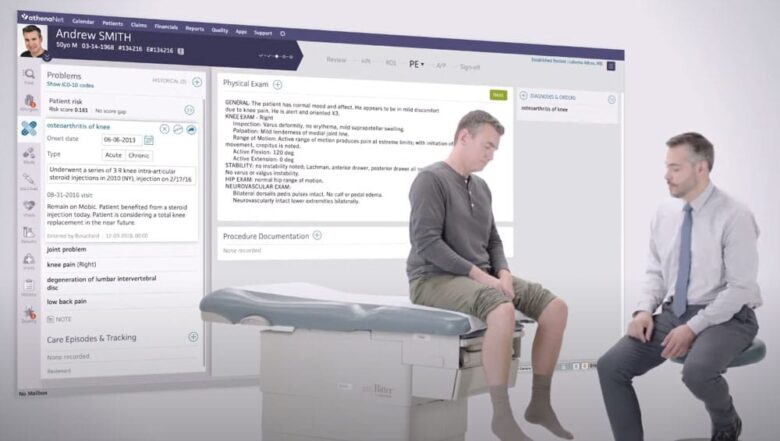If you are looking for the best EMRs out there, this list is just what you need to get you on the right track. Sit back and review these picks on the list of every physician looking to perfect their practice.
Contents
What The Physicians Claim
Not all EMRs are made equally, all physicians attest to that. The truth is that EMR software cannot and should not be everything to all providers. A good EMR must be created without the use of organized charting templates and tailored specifically for providers to function properly in your practice. If not, an EMR may cause your charting to take longer, reduce the quality of your medical care, and waste your important time. A powerful liberating tool that enhances your professional life, an EMR may also be a time-consuming charting process that slows you down and degrades the care you provide to your patients. Let’s see what the doctor ordered:
1. Epic

Source: rawpixel.com
Without a doubt, Epic takes the cake in every EMR systems list. Since its foundation in 1979, Epic Systems has been one of the pioneers of electronic health records. The primary target market for Epic is the healthcare industry, specifically community hospitals, university medical centers, multi-specialty groups, independent practices, and rehabilitation facilities. For five years in a row, the largest part of KLAS has rated Epic’s EHR as the best. The business has its own in-house software and is developer-led and employee-owned.
2. Cerner
For more than 40 years, Cerner has provided electronic medical records. Cerner was established in Kansas City, Missouri, by three accountants. In addition to offering services to healthcare organizations of all sizes and 55 various specializations, Cerner primarily focuses on health information technology solutions. As one of America’s most creative businesses and a top employer for recent grads, Forbes Magazine has acknowledged Cerner. Being a pioneer in this field is something Cerner is extremely proud of.
3. Praxis EMR
Praxis EMR/EHR is an award-winning system founded in 1989 and regarded as the best EHR for small to mid-sized practices. It serves thousands of doctors throughout the United States and around the globe. Concept Processing, an artificial intelligence (AI) tool offered by Praxis, self-learns when the user annotates in free text. As a result of its emphasis on usability and user experience, Praxis is the highest-rated EHR in terms of user happiness at Software Advice, Capterra, AmericanEHR, and in the EHR User Happiness Surveys conducted by the AAFP.
4. Nextech

Source: ai-techpark.com
An EMR and practice management system with all the bells and whistles is called Nextech EMR. For more than 20 years, Nextech has been competing to develop the greatest Emr application. Productivity is increased and smoothly integrated by Nextechs, one of the top EMR programs. EMR and practice management software are both completely linked with it. In all practical areas of practice, Nextech improves efficiency.
5. GE Healthcare
A mega company offering EMR solutions, GE Healthcare, was established in 1994 and has been offering electronic medical records services for the past 25 years. This business is heavily dependent on high-capacity systems and mostly targets large healthcare providers. GE Healthcare was nominated for several categories at the 2019 MCA Awards, including team leader consultant and performance enhancement. By offering individualized healthcare that addresses each patient’s needs, GE Healthcare demonstrates its deep concern for its patients.
6. eClinicalWorks
GroupOne Health Source, a provider of electronic health records that first entered the market in 1999, offers a service known as ecw software. They collaborate with 80,000 facilities, 130,000 medical professionals, and 850 000 nurse practitioners, and they are particularly active with ambulatory health services.
7. AthenaHealth

Source: mdsmedicalsoftware.com
Where there is a mention of EMR, there is sure to be the name Athena. The cloud-based Athenahealth service includes Epocrates and other mobile point-of-care apps, electronic health records (EHR), revenue cycle management, and medical billing. It is appropriate for small to medium-sized practices. It provides the following five solutions: Athenaclinicals, AthenaCollector, AthenaCommunicator, AthenaCoordinator, and AthenaClarity.
8. AllScripts
AllScripts is now called Veradigm; however, most physicians still refer to it as AllScripts. Medic Computer Systems, the predecessor to Allscripts Healthcare Solutions, was established in 1982. In 1986, the company changed its name to reflect its current identity. Numerous hospitals, small- to medium-sized practices, and other healthcare organizations can access their electronic health records. Furthermore, Black Book routinely ranks Allscripts as the top vendor of ambulatory EHR software.
9. NextGen
Almost 155,000 doctors receive software support from NextGen, which has been providing electronic health records services since 1976. With around 2,900 staff members, NextGen is dedicated to enhancing ambulatory care. The enhancement of financial management for its clients is another area where NextGen concentrates.
10. Meditech

Source: bioworld.com
MEDITECH, a privately held provider of healthcare IT, was established in 1969 and specializes in small to medium-sized hospitals (with 100 to 200 beds). It provides solutions for billing, revenue cycle management (RCM), and electronic health records (EHR), as well as LIS and PACs, both in the cloud and on servers. Expanse is a cloud-based EHR that MEDITECH, one of the oldest HealthcareIT providers in the nation, recently released with a focus on better patient-hospital communication.
What Features to Look For
Software for electronic medical records (EHR/EMR) of high quality should be simple to use and intuitive and give doctors the ability to chart fast and effectively. An organic and simple design should be used for the user interface. On a single screen, the top EHRs should capture all the details of a clinical encounter. Reducing the need for repeated clicks on pick lists, drop-down menus, and template fields saves time and effort.
You can only abide by MACRA/MIPS/Meaningful Use and Quality Reporting Programmes and stay out of CMS fines if your EHR is federally certified. Using a certified EHR is crucial regardless of whether you run a concierge medicine, direct payment clinic, or another type of direct pay clinic because only certified EHRs have been tested for the bare minimum in terms of functionality, security, and interoperability, as opposed to non-certified EHRs.
